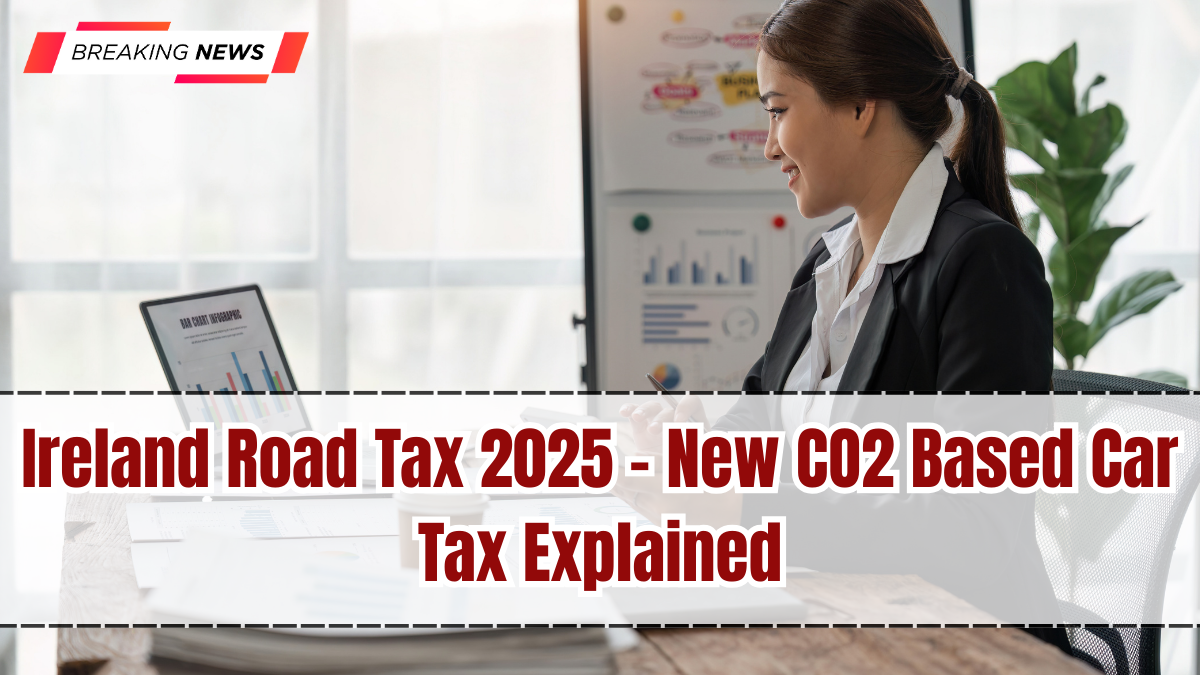Owning and running a car in Ireland comes with annual taxation, and in 2025 the government has updated its car tax system to align with CO2 emissions standards. The Ireland Road Tax 2025 rules introduce revised bands for petrol, diesel, hybrid, and electric vehicles, ensuring that drivers who own cleaner cars pay less, while higher-polluting vehicles face steeper charges.

Why Road Tax Changed in 2025
The Irish government introduced the updated system as part of its ongoing climate action plan. Road transport remains one of the largest contributors to carbon emissions, and by linking tax directly to CO2 output, policymakers hope to incentivize the switch to electric vehicles (EVs) and low-emission hybrids.
The Ireland Road Tax 2025 update also ensures that the country remains aligned with EU climate goals, which mandate aggressive emission reductions in the coming years.
New CO2-Based Bands in 2025
The revised tax system is now divided into CO2-based categories. The more emissions a car produces, the higher the annual road tax. Key highlights include:
-
Electric Vehicles (EVs): €120 flat annual tax, maintaining affordability for zero-emission cars.
-
Hybrids and Plug-in Hybrids (PHEVs): €150–€200 depending on emissions levels.
-
Low-Emission Petrol and Diesel Cars (up to 100g CO2/km): €180 annually.
-
Medium Emission Cars (101–140g CO2/km): €200–€280 annually.
-
High-Emission Cars (141–190g CO2/km): €350–€600 annually.
-
Very High-Emission Cars (over 191g CO2/km): €750 and above, depending on category.
This tiered structure ensures that the Ireland Road Tax 2025 system rewards greener choices while penalizing older, less efficient vehicles.
Impact on Petrol and Diesel Cars
For traditional petrol and diesel vehicles, the changes are significant. Older models with higher CO2 output are now subject to much steeper charges. For example:
-
A 2010 diesel SUV producing 195g CO2/km may now face a €900 annual tax, compared to €710 in 2024.
-
A compact petrol hatchback producing 110g CO2/km pays around €200, keeping costs reasonable for efficient vehicles.
The goal is to encourage owners of high-polluting cars to consider switching to hybrids or EVs.
Hybrids and Plug-in Hybrids
Hybrids continue to benefit under the new system, with relatively low tax rates compared to traditional engines. Plug-in hybrids (PHEVs) that produce less than 80g CO2/km qualify for some of the lowest bands, ensuring affordability for environmentally conscious buyers.
However, the government has clarified that hybrid benefits will gradually reduce over the coming years, signaling an eventual push toward fully electric adoption.
Road Tax for Electric Vehicles
Electric vehicles remain the biggest winners under the Ireland Road Tax 2025 system. EVs enjoy a flat €120 annual tax, keeping ownership costs low and appealing.
Combined with government purchase grants and reduced running costs, EVs are now more competitive than ever against petrol and diesel models. The affordable road tax further incentivizes families and businesses to make the switch.
Public and Business Reaction
Public reaction to the changes has been mixed. Supporters welcome the fairness of a CO2-based system, where those who pollute more pay more. Environmental groups also see the Ireland Road Tax 2025 as a positive step toward lowering emissions.
On the other hand, critics argue that the changes disproportionately affect lower-income households, many of whom drive older diesel cars. Farmers and rural residents, who rely heavily on larger vehicles, have also raised concerns about affordability.
Businesses in logistics and transport are adjusting to higher annual taxes on fleet vehicles, though many are exploring hybrid and electric options to reduce costs.
Comparison with Previous Years
In 2024, road tax bands were already linked to emissions, but the 2025 update tightened categories and raised rates in the higher bands. On average, high-emission car owners will pay €150–€250 more per year compared to 2024.
By contrast, EV and hybrid owners see little to no increase, reinforcing the government’s push for greener adoption.
Looking Ahead
The government has signaled that further increases in high-emission categories are likely by 2027, while EV tax rates are expected to remain stable for the near future. This long-term strategy ensures predictability for buyers planning their next vehicle purchase.
Analysts predict that the Ireland Road Tax 2025 changes will accelerate EV adoption, particularly as charging infrastructure expands nationwide. By 2030, Ireland aims for the majority of new car sales to be electric, with road tax continuing to encourage this transition.
FAQs
How much is road tax for electric cars in Ireland in 2025?
EVs are taxed at a flat €120 annually under the updated system.
Did diesel car owners see higher taxes in 2025?
Yes, higher-emission diesel cars now face increases of €150–€250 per year compared to 2024.
Are hybrids still affordable under the new tax rules?
Yes, hybrids and PHEVs are taxed at €150–€200 depending on emissions, though benefits will reduce over time.
What is the highest road tax band in 2025?
Cars emitting over 191g CO2/km face €750 or more annually.
Will road tax continue to rise in future years?
Yes, the government plans further increases in high-emission categories by 2027, while keeping EVs affordable.
Click here to know more.
